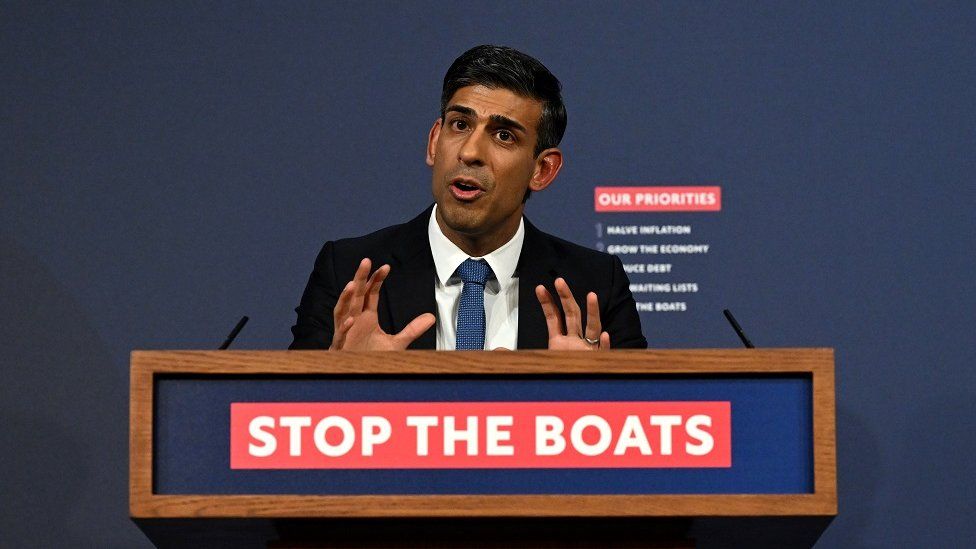ARTICLE AD BOX
 Image source, Leon Neal
Image source, Leon Neal
By David Wallace Lockhart
BBC News political correspondent
Rishi Sunak is in a race against time to deliver on his promise to stop small boats - with new legislation likely to run into opposition both in Parliament and the courts. Here is how the battle could play out.
The prime minister has outlined five key priorities for 2023, and one of them is to "stop small boats" crossing the Channel.
Ministers have published legislation that they believe will do just that - the Illegal Migration bill. But bills, especially controversial ones, can take some time to become law.
And with a general election likely in 2024 the prime minister is up against the clock when it comes to reducing the numbers.
Getting the bill through the House of Commons is the easy part. Rishi Sunak has a large majority there, and his MPs will gladly back him on this issue.
Labour insist the plans are unworkable, and the SNP question the morals behind the policies, but their opposition will not prevent the legislation clearing the Commons.
Things could get trickier in the House of Lords.
The second chamber is likely to want to make amendments. Their changes would then go back to the Commons for consideration.
Sometimes legislation can go back and forth multiple times, a situation known as "ping pong".
How long could this go on for?
Well, to take a recent example, the Nationality and Borders Bill, another controversial piece of migration legislation, took almost five months to become law after entering the Lords.
Legal challenges
Those in government feel that getting the Illegal Migration Bill passed by the summer/autumn would be the best case scenario.
Whenever that happens there will probably still be hurdles for the government to overcome.
Ministers want the law to apply retrospectively, but in order to start reducing the numbers of people coming in small boats they will have to show that the central elements of the bill are workable.
Ministers want to detain anyone who arrives via boat, before subsequently deporting them.
Firstly, do they have the capacity to detain those who arrive? There is plenty of scepticism about whether the space to do this exists.
Secondly, does the UK have the necessary agreements with other countries so that asylum seekers can be sent elsewhere?
There are deals with countries like Albania when it comes to returning Albanian nationals. If it is not possible to send someone back to their home country, the plan is to deport them to a "third country" like Rwanda.
But the Rwanda policy is still tied up in legal challenges. Not one person has been sent there.
While these issues remain unresolved, it's hard to see a scenario where the numbers making the journey drop considerably.
Monumental challenge
And speaking of legal challenges, it's very likely the Illegal Migration Bill will face these once its parliamentary journey is complete.
In a letter to MPs, seen by the BBC, the home secretary said there was "more than a 50% chance" that the legislation was incompatible with the European Convention on Human Rights.
If there are legal challenges, that could significantly delay the law's implementation.
It's difficult to say how long this could all take, but it's worth remembering that the Rwanda scheme has been tied up in the courts for about nine months (and counting).
In promising to "stop the boats", Rishi Sunak has set himself a monumental challenge.
He believes progress in this area means people will be disincentivised to make the journey, and therefore the number of boat journeys will drop.
All of this has to happen within a timescale that allows Mr Sunak to point to proof of success before the next general election.
In many ways it's logical for the Prime Minister to keep the boats issue in the spotlight. The Conservatives are traditionally more comfortable talking about borders than Labour.
But it's a difficult problem to tackle, and he could be setting himself up for failure. His calculation is that progress could deliver significant political rewards, and therefore it's worth the risk.

 1 year ago
102
1 year ago
102








 English (US) ·
English (US) ·